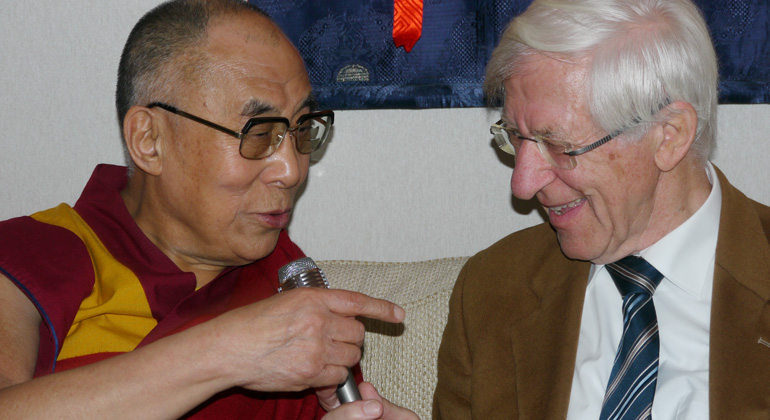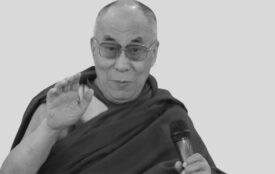“There is an opportunity to create a better world”
The Dalai Lama about the slowly improving political situation in Tibet, the benefit of mindfulness and why some Chinese hardliners still consider him a demon. An Interview by Franz Alt
What is the current status of the human rights in Tibet?
Difficult. Still very difficult. Among the Chinese officials there are still hardliners that are more prominent. The hardliners believe that all problems can be solved by force, by suppression. That’s totally wrong. Unrealistic. I see in many parts of the world that the use of force never solves problems. In the case of Tibet, it has now been 60 years that they have been using force. But more force means that resistance becomes stronger. Still, they do not realise that, that’s the problem. However, among the Chinese public, and also some leaders, they begin to feel that their existing policy of suppression is counterproductive. So they are thinking of a more realistic approach. So we will see. But it’s still too early to say something definite. In the meantime, people suffer immensely. Suffer means not starvation or anything alike, but suffering mentally. Fear, too much anxiety, too much sadness. That is why self-immolation happens.
During the past three years, more than one hundred Tibetans have committed suicide by self-immolation. What is your opinion on these acts of self-destruction?
Of course, this is sad, very very sad. And also, this is such dramatic action, drastic action. I don’t know how much effect this has on those hardliners. There is more anger, more suppression, and in a number of cases like these, members of the family are arrested. This is a very sensitive political issue. And now, since 2011, I totally retired from political responsibility, and then also, whatever I say, the Chinese hardliners always manipulate. They consider me a demon. So every word from the demon’s mouth they always manipulate [lacht]. So, I prefer to keep quite. Only prayer, only prayer.
Most of these suicides were committed by monks. Does Buddhism tolerate suicide?
That depends on motivation. Such action carried with anger, hatred. That mistake, carried with sincere motivation, and then, different.
In many of your lectures all over the world you speak about the concept of mindfulness. Why is mindfulness so important in our time?
Our life, particularly the materialistic society. There is too much attention or involvement in external material values. The material values will not solve our mental-level stress or anxiety or anger or frustration, or these things. So, the mental-level experience such as fear, stress, anger, these things, must be solved, must be reduced. […] Therefore, we need some deeper level of thinking on mental level, not sensory level. Therefore, what I call mindfulness or … or … deeper level. And then, watch, the sensory-level experience, I mean, you should not sort of follow sensory-level experience, but think more deeply. So here, the mindfulness, thinking more deeply, is something very important. Irrespective of religious believer or non-believer. It doesn’t matter, we are same human being. Same emotion, same sort of intelligence. So, we must use our intelligence properly, and then think what you call ‘pros’ and ‘cons’. Some of these emotions are very, very destructive. They not only destroy peace of mind, but also, you see, eventually, destroy our health. Some scientists have already found that peace of mind is very, very important for good health. So, anger, hatred, fear, some medical scientists say, are eating our immune system. So, a calm mind is very very important. I always say: There are seven billion human beings, all have the same potential, all are the same mentally, emotionally, also physically. So, all have the ability to use our intelligence properly. And then, on the basis of pros and cons, […] we should analyse: this is something useful for our health, this is harmful, so we should clear our knowledge: this is something good for our health, this is harmful, so avoid it. Similarly, in the whole of emotion, some emotion is very good, also for our health and peace of mind. And some emotions are very destructive. So, which clear knowledge, the differences, … then we will develop ability to reduce destructive emotion and increase constructive emotion. That, I think, applies to 7 billion people, not only believers or disbelievers.
What is the essence of all religions? Love?
That’s no question. People who believe in God, the creator, they practice love. Many Christian brothers and sisters are really dedicated their life serving others, particularly poor people. Or similarly, … there are many dedicated people. All these come from the teaching of love. In the field of philosophy, there are no big differences. At least I consider that different philosophical views are simply different methods, different ways of approach to promote, to bring conviction, the importance of love, forgiveness, tolerance, and so on.
One hundred year ago, mankind witnessed the outbreak of World War I, resulting in a death toll of 17 million, and some 50 million in World War II. Do you think mankind has learned from these disasters, possibly resulting in the 21st century to become a century of peace?
Sure. I think people, especially Europeans, the Arab people, including yourself, [lachen] and, of course, German people – now, in my previous visit, numerous Germans, old Germans, they had very serious experience during the war, so, some of these old people have still a clear memory of how destructive it was. And similarly in Japan. Therefore, I think both nations, Japan and Germany, and also German people, I think, all those, everywhere are people fed up about violence. Particularly these nations I think because they all have distructive experiences, they are really opposing war and violence. I have had the opportunity to visit quite a number of countries and meet people. Everywhere, I think the desire for peace is, I think, very strong. I want to give you one example: About the Iraq crisis, about the start. The demonstration of Australia and the United States – very strong. And then, also, I think, Japan is the leading or spearhead about anti-nuclear weapons. Because of past experience. Now, the human being seems to be becoming more mature. So, in the desire for peace, or against violence, very strong. So now we need still worldwide effort stop or to reduce or to eliminate these violent methods. So now, just as simply, telling people that we don’t like violence, that we want peace, is not sufficient. We must introduce effective methods. Whenever we encounter problems or source of conflict due to different economy reaons, or even religious sorts of differences, we need, we should educate, the only right method is dialogue. … Consider them also as human brothers and sisters. So I often tell: the past century became century of violence. Now this 21st century should be century of dialogue.
What is the most important goal for the young generation in the future?
I think we, we both, the generation of the 20th century, have created a lot of problems. So now, the 21st century’s generation, let them solve this problem. In a peaceful way, of, in dialogue, so the young generation is really very important. They have the opportunity. Past is past. The 21st century is only 14 years old, the remaining years are still to come. So there is opportunity to create a better world, to change the thinking. Sometimes we face, I think, some problem. Then, our response from our emotion of how to solve this is force. That now must change. Whenever we face some problem. We must introduce, when death comes across, immediately how to solve this through dialogue. On family level, community level, national level or international level, global level. That I think, through education, through …ness, we can promote this concept. … Violent methods are outdated. Media people and also thinkers, educationists have an important role in this field.
Are you optimistic, if you think about the relationship of China and Tibet in the long run? And why?
Yes, optimistic. Why? China, I mean, they hung people and Tibetans. You see, for thousand years, we have lived side by side. Sometimes in the past, very friendly, through marriage and through other reasons. And sometimes, through fight [lacht]. In 7th or 8th century, I think Tibet also invaded China – like that. So past is past. No, I thing one new sort of development. People in … China. In China proper. Buddhist population in China is over 400 million. Many of these Chinese Buddhist are really showing genuine interest in Budhism, and many of the follow… Now I realise there are many Buddhist countries, including China, I think our tradition, I think …. from our tradition … we kept this tradition So very many Chinese Buddhist and Japanese Buddhists very much appreciate our knowledge. Therefore many of these Buddhist and their … brothers and sisters are really showing genuine interest. And then, beside that, Chinese interviewers, writers, in the past three or four years, we noticed about 1000 articles written by Chinese in Chinese language. All 1000 articles fully support our way of approach. … They are very critical toward their own government policy. This is, I think, a clear sign that may Chinese are clearly supporting us. Over the past 2 or 3 years, I met several thousand Chinese. Students, teachers, business men, and some intellectuals, writers, and many of these people are really showing concern about Tibet and showing solidarity with us. And, among the top leaders in China, as I mentioned earlier, now become more realistic. The … visited Europe, when he was in Paris, he expressed that Buddhism is very important in Chinese culture, so he also mentioned Buddhism should take more responsibility regarding preservation of Chinese culture. So this is something quite new. The communist leader now speaks more favourable about Buddhism. That’s something quite new, so things are changing.
Do you pray for the communist leaders in Beijing?
Certainly, they are also human beings. They also want a happy life. So when I say 7 billion, naturally they are included. Particularly those people who have some anger, who have some negative attitudes towards Tibet and towards me, it is our duty to say a special prayer for them. If you want more prayer from me, the you create more problem for me, then more prayer.
Do you see any chance of returning to Tibet?
Oh yes, things are changing. [FA: but you are 78 years old] Yes, if I die this year, then I may not see. But if I live another 5 years, 10 years, 15 years, 20 years, I’m quite sure.
During your current visit to Germany there was no occasion to meet Chancellor Angela Merkel. Would it be beneficial to Tibet if a meeting could be arranged for your next visit?
That depends on the situation. … Sometimes it is better to keep a closer relation to China. Then can do more. Like that. So.
Thank you very much for this interview








